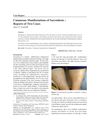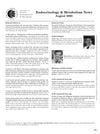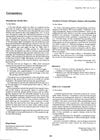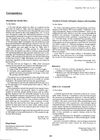 29 citations,
April 2019 in “BMJ. British medical journal”
29 citations,
April 2019 in “BMJ. British medical journal” Men taking dutasteride or finasteride have a slightly higher risk of developing type 2 diabetes.
 August 2018 in “Journal of The American Academy of Dermatology”
August 2018 in “Journal of The American Academy of Dermatology” Hair loss in twins may be linked to family history of hair loss, high blood pressure, heart disease, and possibly anxiety, but more research is needed.
 8 citations,
April 1965 in “Archives of biochemistry and biophysics”
8 citations,
April 1965 in “Archives of biochemistry and biophysics” Sheep wool follicles can metabolize both glucose and acetate using different pathways important for wool growth.
 January 2025 in “Organics”
January 2025 in “Organics” Micelles can change cetirizine's ionization, affecting its effectiveness in treatments.
 15 citations,
August 2021 in “Reviews in endocrine and metabolic disorders”
15 citations,
August 2021 in “Reviews in endocrine and metabolic disorders” COVID-19 and hypopituitarism (reduced pituitary gland function) are linked, with the latter's related health issues potentially worsening COVID-19 outcomes, and COVID-19 possibly increasing risk for pituitary complications.
 December 1989 in “The Journal of Dermatologic Surgery and Oncology”
December 1989 in “The Journal of Dermatologic Surgery and Oncology” New techniques and findings in dermatologic surgery show improved pain management, safer liposuction, better hair transplantation, and effective treatments for skin conditions.
 12 citations,
April 2022 in “Dermatology and therapy”
12 citations,
April 2022 in “Dermatology and therapy” Alopecia areata leads to significantly higher healthcare costs due to more doctor visits and prescriptions.
 1 citations,
January 1998 in “Seminars in Plastic Surgery”
1 citations,
January 1998 in “Seminars in Plastic Surgery” Hair transplantation using micro- and minigraft megasessions is safe, effective, and provides natural results with high patient satisfaction.
 December 2024 in “IntechOpen eBooks”
December 2024 in “IntechOpen eBooks” Trichoscopy helps diagnose and track alopecia areata by examining specific hair and scalp markers.
 March 2017 in “BIRDEM Medical Journal”
March 2017 in “BIRDEM Medical Journal” Sarcoidosis can cause various skin issues, making diagnosis difficult.
 6 citations,
August 2005 in “The Journal of Clinical Endocrinology & Metabolism”
6 citations,
August 2005 in “The Journal of Clinical Endocrinology & Metabolism” Finasteride causes temporary cell death in BPH tissues.

Some medications can cause hair loss, and it's important to track when the hair loss starts after taking a new medication.
 23 citations,
March 1994 in “Fertility and sterility”
23 citations,
March 1994 in “Fertility and sterility” Most patients improved with oral contraceptives, but some needed additional treatment.
 April 2024 in “Dermatology and therapy”
April 2024 in “Dermatology and therapy” There are significant gaps and inconsistencies in diagnosing and treating alopecia areata in Greece and Italy.
 April 2024 in “Proceedings”
April 2024 in “Proceedings” People with alopecia areata often have lower iron levels than healthy people.
34 citations,
June 2015 in “Journal of cardiovascular pharmacology and therapeutics” Direct vasodilators and sympatholytic agents are still useful for certain conditions despite being less common due to side effects and newer drugs.
 1 citations,
February 2022 in “The Journal of Urology”
1 citations,
February 2022 in “The Journal of Urology” Certain drugs like Dutasteride and Finasteride might help fight SARS-CoV-2 by increasing levels of a steroid called DHEA, which can protect the heart and increase nitric oxide to counteract the virus.

Accurate diagnosis and timely, tailored treatments improve outcomes in obstetrics and gynecology.
 September 1987 in “International Journal of Dermatology”
September 1987 in “International Journal of Dermatology” Cimetidine is not a first-choice treatment for female hair loss, and there's no consistently successful treatment for this condition in men or normal hormone level women.
 September 1987 in “International Journal of Dermatology”
September 1987 in “International Journal of Dermatology” Dr. Baral observed that applying minoxidil can cause hair to grow in areas other than where it was applied.
1 citations,
January 2009 in “PubMed” PCOS affects many women and can cause various health issues, with several treatments available.
 1 citations,
October 2023 in “Dermatology and therapy”
1 citations,
October 2023 in “Dermatology and therapy” Some treatments for severe hair loss work but often have side effects, with baricitinib showing the most promise.
 1 citations,
August 2023 in “Journal of cosmetic dermatology (Print)”
1 citations,
August 2023 in “Journal of cosmetic dermatology (Print)” Too much selenium can cause hair loss and nail problems.
 February 2018 in “InTech eBooks”
February 2018 in “InTech eBooks” Diagnosing and treating PCOS is complex due to differing criteria and requires a team approach.
 253 citations,
April 2014 in “Drugs”
253 citations,
April 2014 in “Drugs” Teriflunomide helps reduce multiple sclerosis symptoms and is safe for most patients.
 12 citations,
December 1987 in “Cancer Chemotherapy and Pharmacology”
12 citations,
December 1987 in “Cancer Chemotherapy and Pharmacology” Vitamin E in the diet might help protect against hair loss caused by the chemotherapy drug doxorubicin in rabbits.
 2 citations,
November 2012 in “InTech eBooks”
2 citations,
November 2012 in “InTech eBooks” The document concludes that sex hormones are crucial for mammalian reproduction, health, and behavior, and require more research for therapeutic use.
 24 citations,
January 2001 in “Dermatologic clinics”
24 citations,
January 2001 in “Dermatologic clinics” Hormonal therapy is a treatment option for acne, the only medical treatment for hirsutism, and the most promising for androgenetic alopecia.
1 citations,
September 2021 in “Advances in skin & wound care” SARS-CoV-2 might infect and multiply in skin tissue, possibly aiding in its transmission.
16 citations,
November 2018 in “The journal of pain/Journal of pain” 14,15-EET may help reduce poststroke pain by affecting certain brain proteins.


























